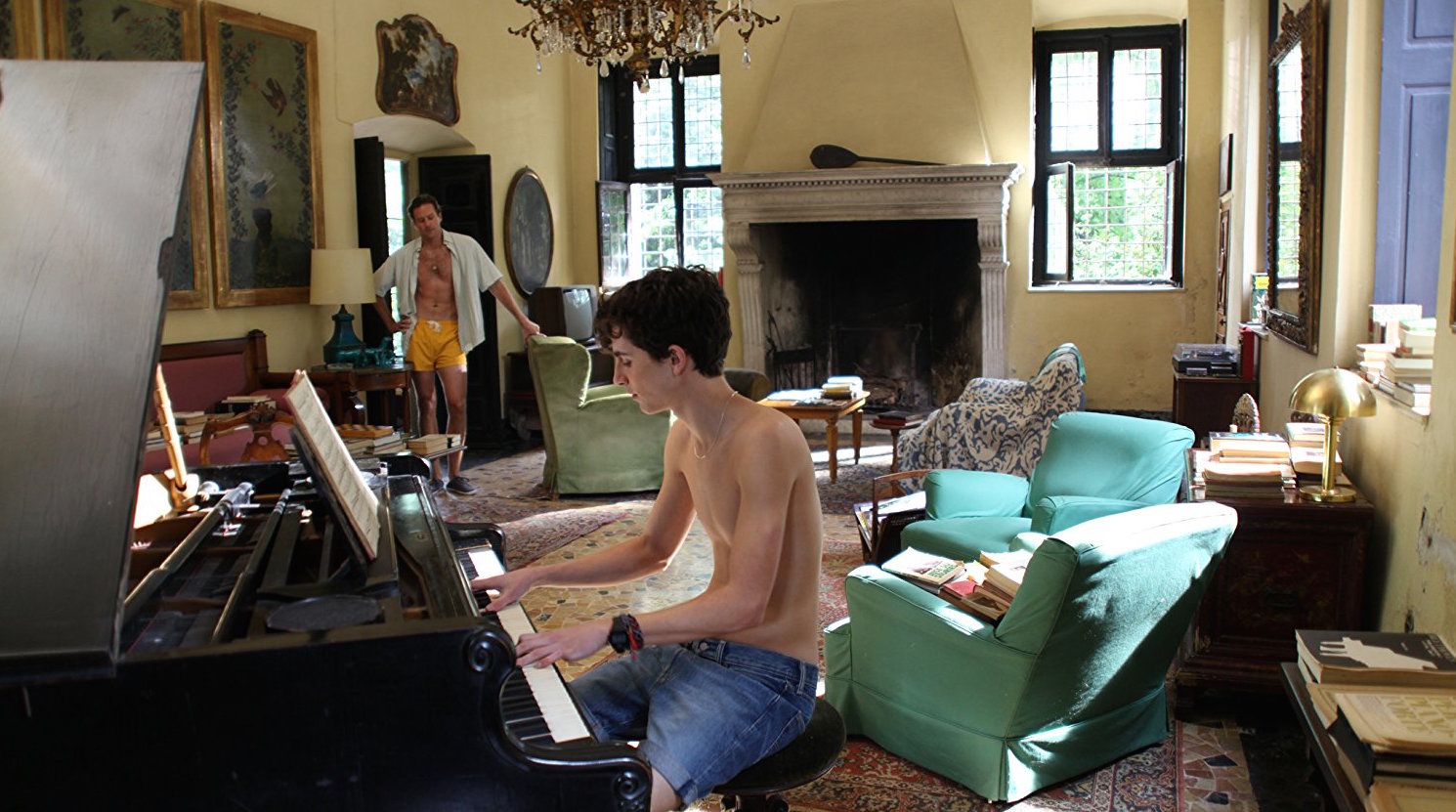Soundtracking: "Call Me By Your Name"
 Monday, January 15, 2018 at 12:30PM
Monday, January 15, 2018 at 12:30PM by Chris Feil
Luca Guadagnino has become one of our top cinematic sensualists, making films built to be felt in the mind, body, and soul. Music is one of the key tools in his arsenal, particularly for how he uses rock music in ways that feel unburdened by music video tactics. Call Me By Your Name is no exception, with both classical and more electronic music highlighting the internal struggle of its protagonist Elio.

The film begins with a John Adams composition, projecting a similar personality to what Elio thinks is expected of him...
Elio performs for guests of the house at the insistence of his parents - but musical innovation is also a key point of Elio’s identity, transcribing the texture of one classical artist onto the work of another. Timothée Chalamet’s prowess shouldn’t be ignored here, particularly for how he manifests Elio’s musical ability and knowledgeability as one of his first posturings towards his beloved Oliver.
It’s significant that Elio comes of age in the shadow of New Wave rock and roll, a purely queer movement. That Talking Heads t-shirt he wears is more than cool kid posturing, it’s a first glimmer of self-identification. But there are still limits to t-shirts and posters on a young man’s wall, and you see his inability to engage with his gayness as “Love My Way” by The Psychedelic Furs plays over a dance party.
This moment notoriously spurred a meme cut all too short, Armie Hammer’s infectious glee inciting Elio’s interest as much as the internet’s. Does Oliver just love the song that much or might it recall the joy of his own first love? There are layers to his lack of self-consciousness while dancing, music providing a release for gay folks to hide in plain sight. And there are lots of eyes at this party, but none more watchful than Elio.
Oliver gets lost in the music in a way that Elio forbids himself. There’s lust in Chalamet’s eyes as he stares Oliver down, but there is also jealousy and confusion. Once Elio finally takes to the dance floor, he can’t even look at Oliver so as not to enact his desire when so close to Oliver’s joyously moving body.
Later on when the two lovers have their getaway, the track plays again in the Italian streets. Oliver still has the same dance moves as Oliver again watches, drunk on too much booze and romantic abandon. The return of the song shuttles him back to that first feeling of shame and longing, and burdens Elio with what he will have to grapple with now that he has made himself seen. The ecstatic release in Oliver’s dancing again feels so far away for Elio - something has irrevocably changed while the music remains the same.
So what to make then of the inclusion of the modern sound of Sufjan Stevens? Lyrically, the first two of his tracks tracks (a remix of “Futile Devices” and the original “Mystery of Love”) describe Elio’s unspoken words in overtly literal verbiage. They somewhat sacrifice the graceful suggestive notes that Guadagnino has been establishing throughout, and underestimate Chalamet’s ability to project Elio’s interiority. Even in their breathy moodsetting they remain the film’s bluntest instrument, though they do intriguingly divide the film’s three acts. Their anachronism also pulls attention from the delicately rendered period details and slightly undermines their authenticity. As lovely a glow they give their scenes, their use only begs “why?”.
The film’s closing Sufjan track, “Visions of Gideon”, is the most compelling use of the artist in the film. The opening strums of the song initially play before the lovers’ first night of passion together, so when the song comes in it is familiar if not immediately placeable. If the film feels like it comes from the perspective of an older Elio decades on, then this song plays like a ghost from the future, the song that makes you recall past love in heartbreaking detail.
Should “Love My Way” be the song that reminds Oliver of the joy of lovers past, then “Visions of Gideon” represents Elio’s more painful version of that. And with the rawness of Chalamet’s tears on screen, the moment suggests a love that will go on haunting him.
The Best Musical Moments of 2017
All Soundtracking installments can be found here!



Reader Comments (2)
Beautiful write up. I esp love watching Chalamet's body language during the fantastic dance sequence (and "Love My Way" has never sounded better).
This was a good article, we need the passion and dedication for the things that we do in our life...